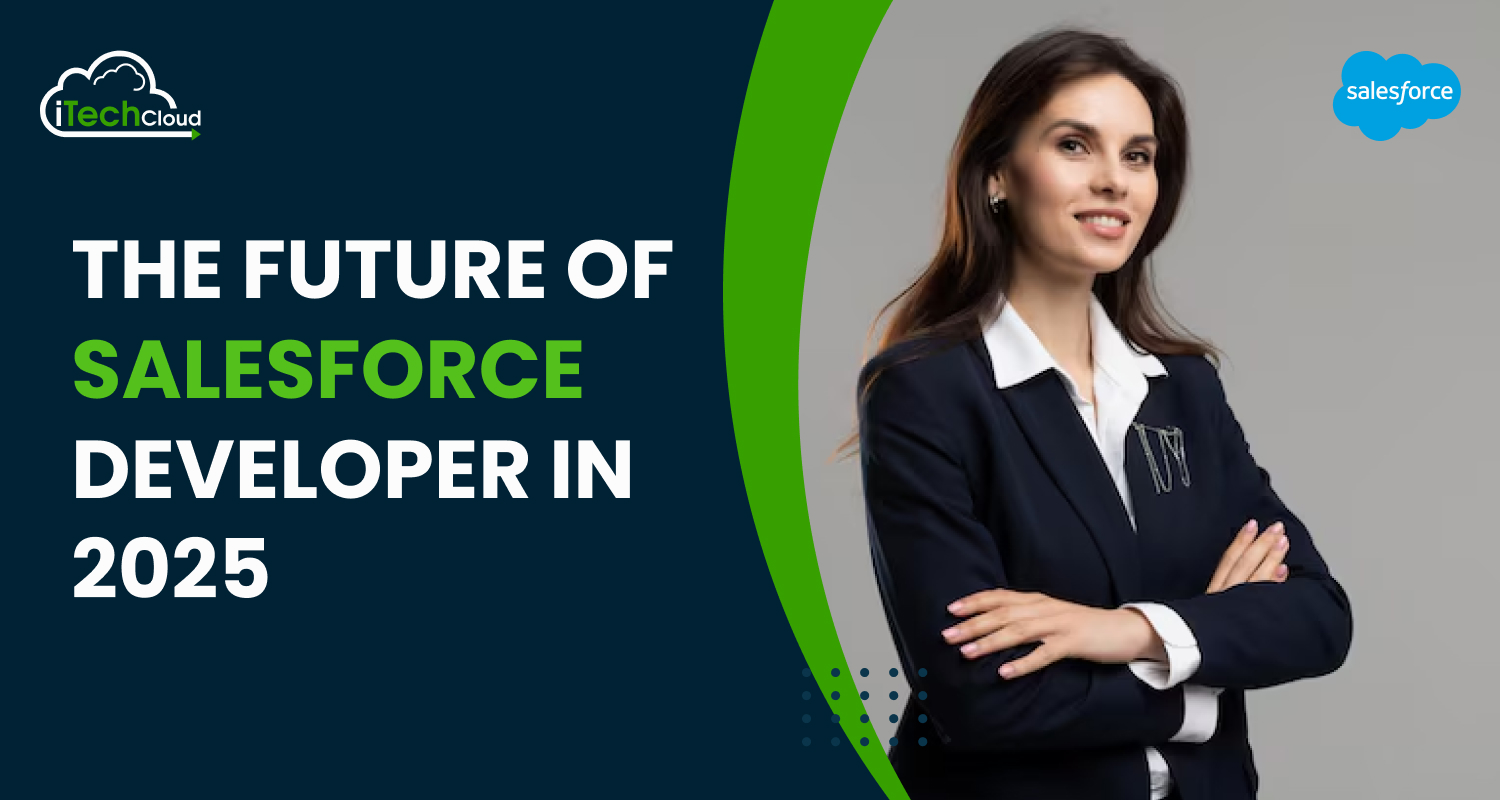Salesforce has been a dominant force in customer relationship management (CRM) for years, continuously evolving with new features, integrations, and technologies. As businesses strive for digital transformation, the role of a Salesforce Developer has become more significant than ever. But what does the future hold for Salesforce developers in 2025? In this blog, we will explore industry trends, technological advancements, career prospects, and how developers can prepare for the evolving landscape of Salesforce development.
The Growing Demand for Salesforce Developers
With businesses increasingly adopting cloud computing and AI-driven automation, Salesforce remains at the forefront of CRM solutions. In 2025, we expect to see even greater demand for Salesforce developers due to:
- Expanding Salesforce Ecosystem: Salesforce continues to expand its ecosystem with new products, such as Salesforce Genie, and Hyperforce, and deeper integrations with AI-powered tools like Einstein AI.
- Enterprise Digital Transformation: Organizations worldwide are migrating from traditional systems to cloud-based CRMs, increasing the need for Salesforce customization and development.
- Integration with Other Technologies: Salesforce is integrating with IoT, blockchain, and automation tools, making developers with cross-platform expertise highly valuable.
- Remote Work & Global Talent Acquisition: With remote work becoming the norm, companies are hiring Salesforce developers from across the globe, increasing career opportunities.
Emerging Technologies Shaping Salesforce Development
1. Artificial Intelligence & Einstein AI
Salesforce Einstein AI is transforming how businesses leverage AI for data-driven decisions, automation, and enhanced customer experiences. Salesforce developers must gain expertise in:
- Einstein GPT – The first generative AI for CRM, improving chatbot interactions and predictive analytics.
- AI-Powered Workflows – Automating complex business processes with AI-driven logic.
- Machine Learning Models – Implementing AI-based recommendations and data insights within Salesforce applications.
2. Salesforce DevOps & Automation
DevOps has become an integral part of software development, and in 2025, Salesforce DevOps is expected to see widespread adoption. Tools like Salesforce DevOps Center, Gearset, Copado, and AutoRABIT help developers automate deployment, testing, and monitoring. Key trends include:
- Continuous Integration & Deployment (CI/CD) for seamless code releases.
- Automated Testing to improve code quality and reduce bugs.
- Version Control Systems (like Git) to manage collaborative development.
3. Low-Code & No-Code Development
Salesforce’s low-code/no-code capabilities empower non-technical users to build applications without extensive coding knowledge. However, developers still play a critical role in:
- Enhancing App Functionality with custom Apex, Lightning Components, and LWC (Lightning Web Components).
- Integrating APIs & External Systems with Salesforce.
- Providing Scalability & Security to enterprise-level applications.
4. Hyperforce & Multi-Cloud Integration
Salesforce Hyperforce enables companies to deploy Salesforce applications in any public cloud (AWS, Google Cloud, Azure, etc.), ensuring compliance and scalability. By 2025, developers will need skills in:
- Multi-Cloud Deployments – Optimizing Salesforce across different cloud environments.
- Security & Compliance – Ensuring data privacy and regulatory compliance.
- Performance Optimization – Leveraging cloud resources for faster application performance.
5. Blockchain Integration
Blockchain is gradually finding its way into Salesforce through Salesforce Blockchain, enabling businesses to create trusted, decentralized applications. Developers will benefit from learning:
- Smart Contracts – Automating business processes with blockchain-based agreements.
- Decentralized Identity Management – Enhancing data security.
- Immutable Records – Creating tamper-proof data storage for compliance-sensitive industries.
Career Opportunities & Future Prospects for Salesforce Developers
The job market for Salesforce developers is expected to grow significantly by 2025, with opportunities in various domains such as:
- Enterprise-Level Development: Large corporations hire experienced developers to customize and integrate Salesforce solutions.
- Freelancing & Consulting: Independent developers providing customized Salesforce solutions.
- AI & Data Science Roles: Utilizing Salesforce Einstein AI for advanced analytics.
- DevOps & Automation Experts: Managing CI/CD pipelines and automation in Salesforce development.
- Blockchain & Security Specialists: Ensuring Salesforce data integrity using blockchain.
Essential Skills for Salesforce Developers in 2025
To stay competitive, Salesforce developers should focus on acquiring the following skills:
Technical Skills:
- Apex Programming – Core coding language for Salesforce customizations.
- Lightning Web Components (LWC) – Advanced front-end development.
- Salesforce DevOps – CI/CD, Git, Jenkins, and DevOps Center.
- API & Integration – REST/SOAP APIs, MuleSoft, and third-party integrations.
- Einstein AI & Automation – Implementing AI-driven solutions.
- Multi-Cloud & Hyperforce – Deploying Salesforce across multiple cloud providers.
- Blockchain for Salesforce – Smart contracts, secure data storage.
Soft Skills:
- Problem-Solving & Critical Thinking – Addressing complex business challenges.
- Communication & Collaboration – Working with cross-functional teams.
- Adaptability & Continuous Learning – Keeping up with Salesforce updates.
- Time Management & Agile Methodology – Managing projects efficiently.
How to Prepare for the Future as a Salesforce Developer
1. Continuous Learning & Certifications
To stay ahead, developers should pursue Salesforce certifications such as:
- Salesforce Certified Platform Developer I & II
- Salesforce Certified Application Architect
- Salesforce Certified AI Associate (for Einstein AI)
- Salesforce DevOps Certifications (Copado, Gearset, etc.)
2. Engage in the Salesforce Community
- Join the Salesforce Trailblazer Community.
- Attend Salesforce events like Dreamforce and TrailblazerDX.
- Contribute to open-source projects on GitHub.
3. Hands-On Practice & Real-World Projects
- Work on real-life Salesforce projects.
- Develop custom applications using Lightning and Apex.
- Experiment with AI, blockchain, and multi-cloud solutions.
4. Stay Updated with Salesforce Releases
Salesforce rolls out three major updates per year. Developers must:
- Read release notes.
- Test new features in sandbox environments.
- Implement best practices to optimize Salesforce applications.
Conclusion
The future of Salesforce development in 2025 is promising, with AI, automation, DevOps, and multi-cloud computing shaping the industry. Developers who embrace these trends and continuously upgrade their skills will be in high demand. By focusing on technical expertise, certifications, and hands-on experience, Salesforce developers can secure lucrative and rewarding careers in the evolving digital landscape.


